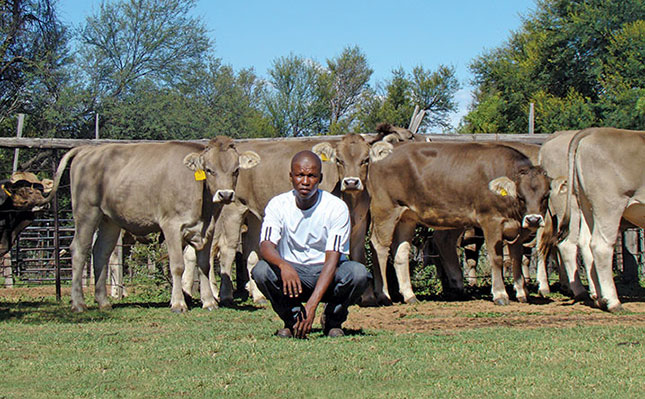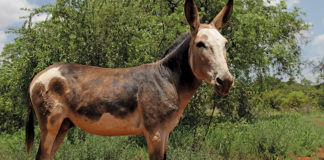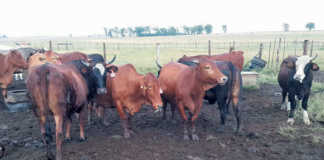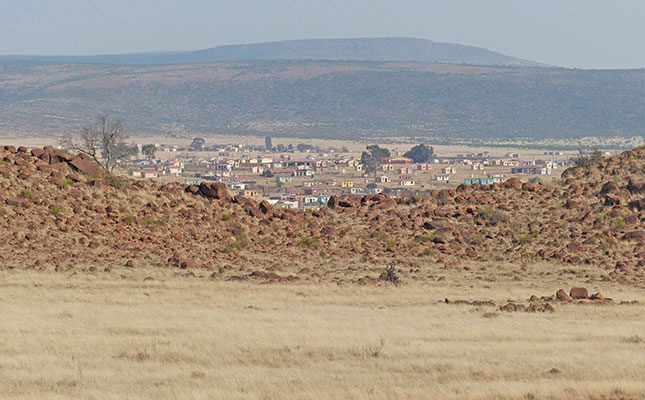
Photo: Mike Burgess
“Communal farming is a struggle, says Zolani Tsheko. “You are dependent on others, and therefore, you can drown with them.”
Tsheko, an educator by training, has been a part-time livestock farmer since 1980 and a full-time farmer since retiring as an accomplished principal in 2015.
“I am trying to apply commercial farming methods as best as I can under challenging communal circumstances. It is very challenging,” he says about his approach to running his 178 Merino sheep and seven cattle in Thornhill near Queenstown in the Eastern Cape.
Tsheko was born in the former Transkei region of the Eastern Cape near the town of Herschel. The first born of seven children, he primarily recalls a life of grinding poverty.
“We had nothing,” he says. “My mother raised some chickens, and my father grew up herding livestock for other people.” Nevertheless, his father was hard-working, taking on various jobs as a farmworker, road construction worker, fencer, and shearer during his life.
Tsheko completed primary school, but faced a dilemma: he did not have enough money to pay the school fees needed to matriculate.
Consequently, he signed up to work in the platinum mines of Rustenburg, North West, for a year to earn the necessary funds to matriculate.
Immediately after school, he took on a job as an unqualified teacher near Herschel. However, in 1976, the family was relocated by the Nationalist government to Thornhill in the former Ciskei, and in 1978, Tsheko enrolled at Whittlesea Teachers Training College.
By 1980, he was teaching full-time near Thornhill, where he bought five sheep and a few cattle from a local farmer. In 2001, he joined the local Masizakhe Shearing Shed, which was built by the community.
However, he will be best remembered for leveraging the Eastern Cape government to build a brand-new shed in 2019/20 when he was still the chairman of the shearing shed committee.
Today, the sheep of 108 communal farmers are shorn in the shed annually, producing an impressive 100 bales that are marketed through the brokers BKB and OVK.
Communal Challenges
The core challenge in communal farming is access to quality grazing, a situation that worsens significantly during droughts.
“In the communal context, droughts can be devastating,” says Tsheko. “This is because there is no mutual understanding to preserve grazing.”
Communal grazing practices have numerous implications for more serious farmers like Tsheko. For example, it makes effective breeding impossible, as the separation of rogue rams and bulls from one’s ewes and cows is nearly impossible.
“It’s very difficult to manage your breeding,” he says. “Everybody’s rams are running around on the communal grazing areas.”
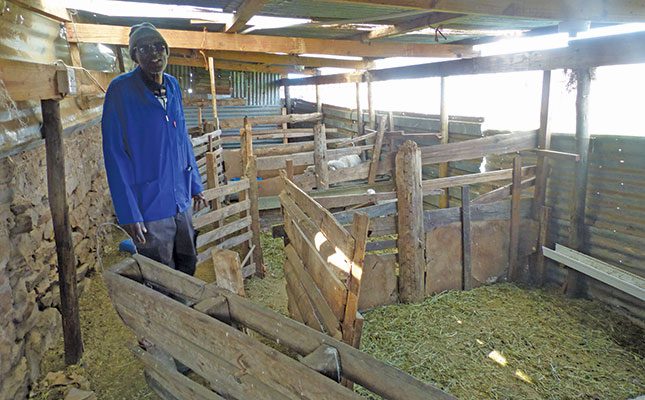
Attempts have been made to manage this situation, but with limited success.
“We try to tell people to keep rams in their homestead yards because we don’t have a ram camp,” he says. “But people say they will have no feed in the yard for them.”
Communally run livestock also makes it very difficult to manage diseases like sheep scab and parasites such as red lice, as these conditions spread through direct contact between sheep.
Another issue is supplementation, as providing licks successfully is near impossible.
“If you put licks out in the veld, you will be feeding everything else except your own animals,” says Tsheko.
Despite effective livestock identification, stock theft remains a major challenge, as the law enforcement and judicial systems ensure ‘soft’ consequences for criminals. “There is no way to fix it,” says Tsheko. “You must start over.”
Management against the odds
Since the termination several years ago of the once lauded genetic improvement scheme run by the National Wool Growers’ Association and the Eastern Cape Department of Rural Development and Agrarian Reform, Tsheko has been forced to source his own rams from commercial and stud farmers.
During the breeding season, his rams are kept away from communal grazing areas and are put to his ewes after they have been kraaled in the late afternoon.
“Ewes come back to the kraal at 4pm or 5pm and the rams then work at night.”
About 40 ewes (of his approximately 70) are synchronised each breeding season to improve management, while some are lambed in makeshift lambing pens.
During winter, a protein lick is given to sheep in their kraals, and before ewes are put to the rams, Tsheko feeds them in preparation for mating, as the natural grazing in early spring is normally exceptionally poor. His ewes achieve an 80% lambing rate and lambs are weaned at the age of three months.
In the face of poor grazing resources, he tries to produce as much extra feed as possible, and for example produces oats, maize and lucerne on about 2,5ha along the Swart Kei River.
Water is pumped from the river with a diesel engine to ensure effective irrigation through a sprinkler system.
This initiative was made possible by receiving permission to utilise the land from traditional authorities, a rented tractor to do the ploughing, and the establishment of good fencing around the cultivated lands to ensure that communal livestock cannot enter.
This extra feed has proved to be an invaluable resource when Tsheko breeds, weans and rounds off his sheep, as well as when he culls old ewes and wethers for the slaughter market.
According to him, despite the numerous communal challenges to wool farming, it is still a popular money-making venture, especially for the elderly.
“It [wool farming] is growing as people who retire buy sheep,” he says. “The problem is that this means ever-increasing pressure on grazing resources that never increase in size. My greatest wish is to have more land. I have reached my ceiling. I need more land; land is life.”
Phone Zolani Tsheko on 083 422 3826.








